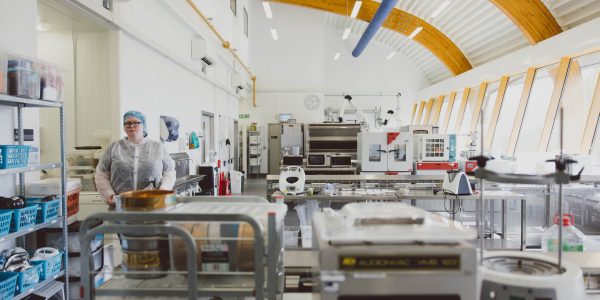Fungi alternatives could diversify sustainable sources of protein to feed the world
October 11, 2023
This post is by Professor Paul Dyer, Professor of Fungal Biology at the University of Nottingham. Our food system feeds 8 billion people each day, but this comes at ever increasing environmental costs in terms of land, water, greenhouse gas emissions, and biodiversity loss. With the rising global population and soaring demand for protein, there …
Goodbye to the Future Food Beacon and welcome to the Food Systems Institute
July 5, 2023
In 2017 the University of Nottingham launched its six ‘Beacons of Excellence’, including the Future Food Beacon. This represented a very different approach by the University to research funding, which directed its own money toward areas in which we already had considerable expertise, and that could be expanded to become globally recognised as a world–leading. …
Transforming our food systems
July 3, 2023
In 2017, the University of Nottingham launched the Future Food Beacon to help address the challenge of sustainably and nutritiously feeding a growing world population. After six years laying the research foundation and building partnerships and a research pipeline, the University is launching the University of Nottingham Food Systems Institute to take an interdisciplinary approach …
Is the UK losing its way in transitioning towards a more healthy and sustainable food system?
April 4, 2023
This post is written by Andrew Salter. The Future Food Beacon was launched in 2017 with the aim of ‘working across the food system to explore ways to future proof food security’, with an ambitious strap line of ‘ A world with nutritious food for all’. This was at a time of increasing recognition that at …
Our Future Food Director’s first thoughts
October 19, 2022
This post is written by Andrew Salter. It has been a very strange start to the autumn term for me. For over 30 years, this time of year has been associated with preparing for teaching in the forthcoming semester. Instead, while I watch my colleagues going through this process, I am trying to get to …
Future Food PhD wins prestigious Carlos Fuentes award
September 21, 2022
Karla G. Hernandez-Aguilar, a PhD candidate with the Palaeobenchmarking Resistant Agricultural Systems project, has been awarded a Carlos Fuentes award by the Mexican Society of the UK for her PhD research. Karla’s PhD project is titled: Understanding microenvironments and the potential of traditional agricultural systems in a changing climate in Mexico and Belize. Her interdisciplinary …
Open letter from Prof David E Salt, Director of the Future Food Beacon of Excellence
April 8, 2022
Following on from the recent announcement by Zoe Wilson PVC Science (5th April, 2022) that I will be stepping down as the Director of the Future Food Beacon on the 31st July 2022, I would like to take this opportunity to thank you for all your support and hard work. Your willingness to contribute to …
How do plant roots branch towards water?
February 27, 2020
Plant roots need to forage for water and nutrients in the soil. These key resources are not distributed equally through the soil so plants therefore have to send their roots towards the best available sources of water and nutrients. If plants couldn’t flexibly adapt to changing conditions in their environments, they would struggle to thrive …
The new agricultural bill: soils, sustainability and farming
February 4, 2020
It may have already left your news feed, but a few weeks ago a new agricultural bill was presented in parliament. We spoke to some of our local soil and plant scientists, Prof Sacha Mooney, President of the British Society of Soil Science, and Prof Malcolm Bennett, and Prof David Salt on what the new …
Giant Swamp Taro: plant for the future?
June 7, 2019
Giant Swamp Taro (Cyrtosperma merkusii) is an underutilised but highly productive plant native to the North Sulawesi region of Indonesia. It can grow up to 5 metres tall, and may produce tubers underground that are 2 metres in diameter and up to 3 metres in length. It grows in flooded, brackish conditions. This makes it an …










Recent Comments